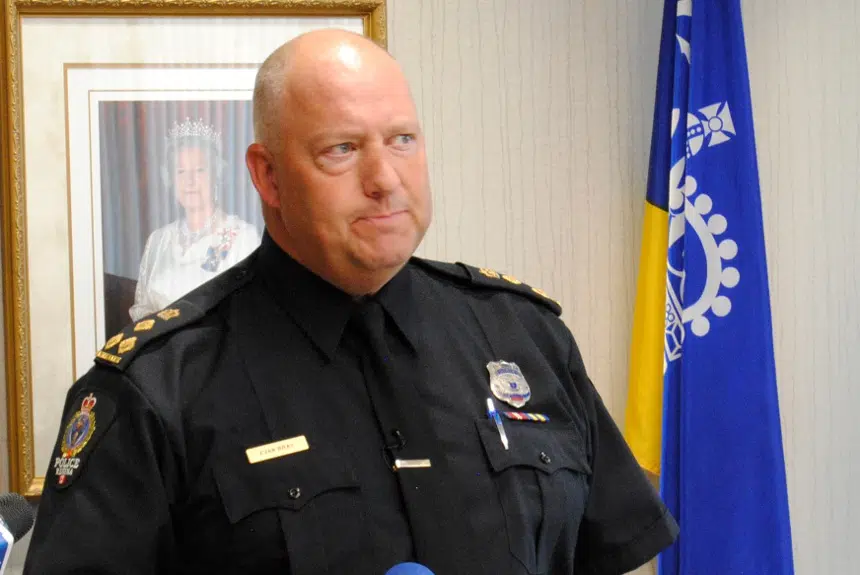For many people, the bar is set pretty low for the new year to be better than the last one.
With a COVID-19 vaccine program gearing up and the possible end of the pandemic in sight, Regina’s police chief, Evan Bray, said it’s hard to completely understand what the new normal is going to look like.
“There is going to be a day, hopefully in the not too distant future, where we can gather without masks and we can kind of go back to some form of normalcy,” said Bray. “But I think we’re all affected. The generation that is living right now will look and live differently going forward even if it’s just the use of hand sanitizer and washing your hands.”
Bray said the pandemic has given people a chance to refocus and look at what the priorities are in the community, and he hopes the police service can focus on its priorities in the new year— crime and keeping people safe.
Overdoses
Saskatchewan and Regina hit a record for overdoses and overdose deaths in 2020 and that problem is unlikely to end just because the odometer has flipped over on the year.
Bray said Regina police will continue their strong enforcement against drug trafficking in the city. Bray said there are other components to that problem; one is harm reduction and he said there are now more and more community groups calling loudly for harm reduction measures in the city including naloxone kits and safe inhalation kits.
“Things that basically respect and understand that people with an addiction are going to do drugs so it’s not about trying to prevent them, but first and foremost let’s give them a safe way in which to do those drugs so that they don’t have some sort of a dire health situation, or worse yet, lose their life as a result of it,” said Bray.
Opportunities
One thing Bray is excited about for the year ahead is possibly seeing results from some of the police service’s recruiting strategies to improve the diversity of the force.
“We’ve been working with our First Nations community and, most recently, Black in Sask to enhance and move forward some positive steps with regard to diversity in terms of hiring,” said Bray.
Bray said he’s also hoping physical work will start on the new police headquarters in 2021.
The service bought the old STC building across the street from the current headquarters and the end plan is to close Osler Street and build to connect the two.
Bray said it’ll take about two years to finish but it’s something he’s excited to see through.
Challenges
In 2020 there was a lot of talk started about what kinds of calls police should actually be responding to, stemming from several high-profile incidents across North America where people in the midst of mental health crises were shot and killed by police.
Bray said it’s going to be a challenge in the coming year, but also an opportunity, to parse through those issues.
According to Bray, it’s usually not a situation where police wouldn’t respond at all because often someone doesn’t call 911 and say someone is having a mental health crisis. He said a person will call and say that someone has a knife or someone is on the roof.
“Police will go and bring about resolve and calm to the situation and take the risk away, and then once that’s done it becomes often very apparent that that person has an addiction problem or that person is suffering from mental illness,” explained Bray.
Bray said where he thinks police don’t need to be involved is sitting with that person for the next eight hours in the hospital. He said real change could be created if there were an organization with people trained to help that person so they wouldn’t have to interact with police again the next night.
The 2021 city budget will be the first since the defund police movement began getting wider traction — a movement to take money out of police budgets and put it in the hands of community organizations in an attempt to get at the roots of crime and reduce the potentially dangerous interactions people have with police.
Bray agrees with more support for such organizations, but said it’s not just as simple as taking money from one and putting it into another.
“This needs to be a discussion and decisions that are made not out of emotion and I think there’s a lot of people who want to make decisions out of emotion on this issue,” said Bray.
Bray said police are incredibly busy, noting he could triple the number of people he has in drug or child exploitation investigations and they would still barely skim the surface.
Bray said resources for policing could be better distributed if they were able to take some of officers’ mental health work away, but he said if police stop going to calls then there needs to be an organization ready to step into that role, and that doesn’t just happen overnight.











